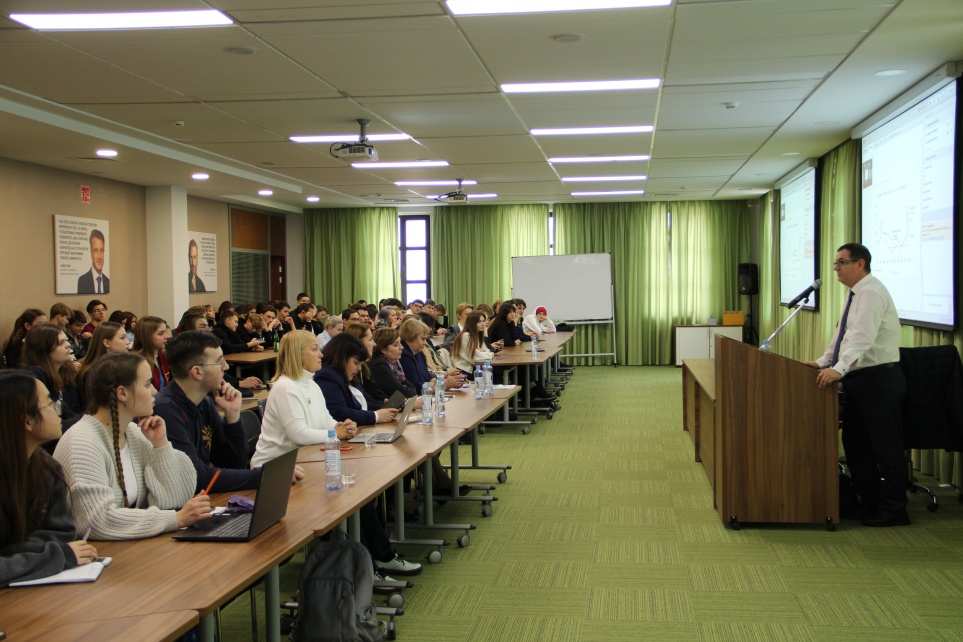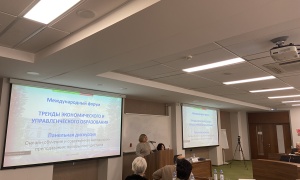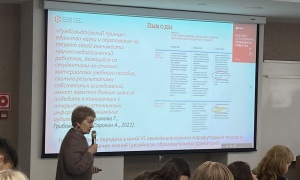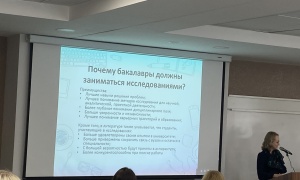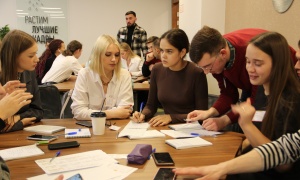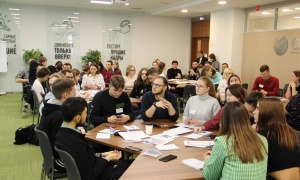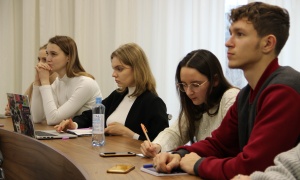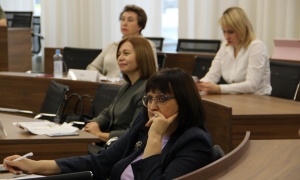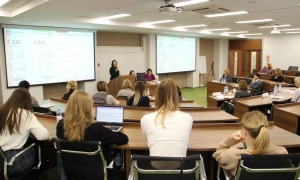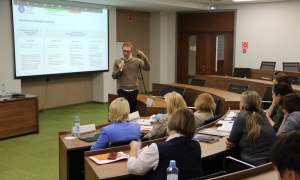
The Challenges of Post Distant Education, the Dialog between University and Business: the International Forum took place at IEM
On November 10-11 the International Forum ŌĆ£Trends of Economic and Management EducationŌĆØ took place at the Institute of Economics and Management. Participants discussed online education and challenges of post distant era, formats of cooperation between business and education in implementation of academic programs. They also covered the ways of integration of the results of fundamental and applied research into the educational process. A round table ŌĆ£Training of personnel for government and public administration in modern environmentŌĆØ, public lectures, master classes and simulator games were carried out during the Forum.
The Head of Economic Department of Siberian Main Branch of the Bank of Russia, PhD in economy, Evgeniy Haczkevich gave a lecture ŌĆ£Monetary policy of the Bank of RussiaŌĆØ, which in his words is based on three principles: a public objective for the inflation, floating exchange rate of rouble and information transparency. Program documents, bank market data, rates, bank operations are uploaded to the website. The actual report on the monetary policy is also available. Since the end of the last year the indicator of business climate has also been published. This is unique because itŌĆÖs the view of 14000 companies reflecting factual and prognosed changes in the spheres of production and demand.
The simulator games ŌĆ£On first-name basis with finances and ŌĆ£Key interest rateŌĆØ were organized for students by the experts of Siberian Main Branch of the Bank of Russia Tomsk Region Department. The ŌĆ£Key interest rateŌĆØ game has been tested the first time in the region. While in the first game the students answered questions of a financial quiz, the second one was more difficult and lasted more than four hours.
An old partner of the IEM, independent expert with more than 20 years of experience in the field of major regional business Angelica Jurakovskaya made a report ŌĆ£Why standard formats of cooperation with universities are not beneficial l to the business?ŌĆØ She mentioned the existence of a collision represented with big amount of inequalities. An employer who is good for a university is not always good for students. Because he makes them work. A graduate is also different in the eyes of the university and the employer. And so on. When externships are organized, the university must get acquainted with the enterprises, show the variety of enterprises with different characteristics for different students with different motivation, she resumed adding that the business is ready to help with practical aspects of graduation work when the students understand their task.
The Director of the Center of Advanced Training of TSU Svetlana Veledenskaya during the discussion on the challenge of post distant education emphasized that, ItŌĆÖs time to consider online education not as entity but as possibility. Digital environment makes the process more interesting but simultaneously difficult. We must speak about rebuilding of the educational process, it must be reconsidered and we need help there.
During the case method section the colleagues shared their views. Andrey Starkov, Associate Professor of Marketing Department of HSE Graduate School of Business presented the HSE editions. According to him, there are 50 cases in the library currently, the focus is on Russian companies. 26% of the cases are dedicated to innovation management, 15% to marketing and 11% to HR. The editions are available here. The cases may be found on the website and in the ŌĆ£LanŌĆØ system. Andrey also told that the HSE Study Cases Resource Center makes expert examination and registration of the cases provided by HSE employees and other authors. There is a form on the website for the authors.
Participants of the panel discussion ŌĆ£Integration of results of fundamental and applied research into the educational processŌĆØ discussed different aspects of research activity and universities experience of implementing the results in education. Anna Veselova, Associate Professor of HSE Management Department shared experience of her alma-mater. She emphasized the importance of two main processes: integration of knowledge obtained during research into the educational process and involving the students into the activity.
Evgeniya Popova, Associate Professor of Department of Political science of TSU raised a point: how necessary is the research activity for students and how strongly research competencies are required on the labor market? And if this is the case what is the most effective way to create such competencies in the university? To accomplish this task Evgeniya Vladimirovna offers following measures: aggregation of universityŌĆÖs resources for key research programs; cross-disciplinary joint research projects; and problem-based learning of research competition using applied problems.
Margarita Kurbatova, Doctor of Economics, Professor of Siberian Federal University (Krasnoyarsk) shared her impression of the Forum:
ŌĆśTSU is a good example of preserving the traditional values. The university is one living organism. I like the educational self-reflection and live ideas here. There is always rich cultural aspect which is the main valueŌĆÖ.
The Head of Economic Department of Siberian Main Branch of the Bank of Russia, PhD in economy, Evgeniy Haczkevich gave a lecture ŌĆ£Monetary policy of the Bank of RussiaŌĆØ, which in his words is based on three principles: a public objective for the inflation, floating exchange rate of rouble and information transparency. Program documents, bank market data, rates, bank operations are uploaded to the website. The actual report on the monetary policy is also available. Since the end of the last year the indicator of business climate has also been published. This is unique because itŌĆÖs the view of 14000 companies reflecting factual and prognosed changes in the spheres of production and demand.
The simulator games ŌĆ£On first-name basis with finances and ŌĆ£Key interest rateŌĆØ were organized for students by the experts of Siberian Main Branch of the Bank of Russia Tomsk Region Department. The ŌĆ£Key interest rateŌĆØ game has been tested the first time in the region. While in the first game the students answered questions of a financial quiz, the second one was more difficult and lasted more than four hours.
An old partner of the IEM, independent expert with more than 20 years of experience in the field of major regional business Angelica Jurakovskaya made a report ŌĆ£Why standard formats of cooperation with universities are not beneficial l to the business?ŌĆØ She mentioned the existence of a collision represented with big amount of inequalities. An employer who is good for a university is not always good for students. Because he makes them work. A graduate is also different in the eyes of the university and the employer. And so on. When externships are organized, the university must get acquainted with the enterprises, show the variety of enterprises with different characteristics for different students with different motivation, she resumed adding that the business is ready to help with practical aspects of graduation work when the students understand their task.
The Director of the Center of Advanced Training of TSU Svetlana Veledenskaya during the discussion on the challenge of post distant education emphasized that, ItŌĆÖs time to consider online education not as entity but as possibility. Digital environment makes the process more interesting but simultaneously difficult. We must speak about rebuilding of the educational process, it must be reconsidered and we need help there.
During the case method section the colleagues shared their views. Andrey Starkov, Associate Professor of Marketing Department of HSE Graduate School of Business presented the HSE editions. According to him, there are 50 cases in the library currently, the focus is on Russian companies. 26% of the cases are dedicated to innovation management, 15% to marketing and 11% to HR. The editions are available here. The cases may be found on the website and in the ŌĆ£LanŌĆØ system. Andrey also told that the HSE Study Cases Resource Center makes expert examination and registration of the cases provided by HSE employees and other authors. There is a form on the website for the authors.
Participants of the panel discussion ŌĆ£Integration of results of fundamental and applied research into the educational processŌĆØ discussed different aspects of research activity and universities experience of implementing the results in education. Anna Veselova, Associate Professor of HSE Management Department shared experience of her alma-mater. She emphasized the importance of two main processes: integration of knowledge obtained during research into the educational process and involving the students into the activity.
Evgeniya Popova, Associate Professor of Department of Political science of TSU raised a point: how necessary is the research activity for students and how strongly research competencies are required on the labor market? And if this is the case what is the most effective way to create such competencies in the university? To accomplish this task Evgeniya Vladimirovna offers following measures: aggregation of universityŌĆÖs resources for key research programs; cross-disciplinary joint research projects; and problem-based learning of research competition using applied problems.
Margarita Kurbatova, Doctor of Economics, Professor of Siberian Federal University (Krasnoyarsk) shared her impression of the Forum:
ŌĆśTSU is a good example of preserving the traditional values. The university is one living organism. I like the educational self-reflection and live ideas here. There is always rich cultural aspect which is the main valueŌĆÖ.
